There are major benefits of buying in bulk; you can buy zero waste and it cuts down on both waste and recyclable materials when buying in bulk as much as possible. Today I buy almost everything in bulk: flour, grains, nuts, beans, shampoo, conditioner, spices, oils, chocolate, coffee, bee pollen, dried fruits, snacks, maple syrup and, of course, fruits and vegetables.
So I can see easily what is in each jar, I like to store my bulk foods in glass. They keep the food fresh and safe from pests such as kitchen moths, and I can see how much of everything I have and whether I need to add items to my grocery list. Buying in bulk cuts down on product packaging and transportation costs, reduces waste, and is usually cheaper. So, it is cost-effective and good for the environment.
Too much of all food packaging is unnecessary, and it could be prevented because it is purely for marketing purposes. According to earth911.com, food packaging accounts for about 8 percent of food’s cost. A study by Portland University found that companies marketing bulk foods versus packaged foods would see an average 54% reduction in material and delivery costs on items including bulk confections, dried fruit, nuts and trail mix.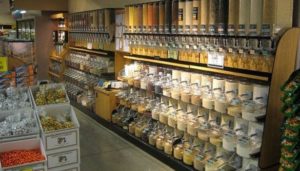 The problem with food packaging is that production of food packaging takes a tremendous amount of energy and a great number of resources. Too much paper, water, aluminum and plastic go into producing the wrappers, bags and boxes for food products. Sadly, less than half of recyclable packaging material is recycled, so the rest is sent to the landfill. Although recycling is a very good way to reduce waste and a much better option than throwing more waste into the landfill, the materials that do get recycled still require energy and resources for reprocessing them into new products.
The problem with food packaging is that production of food packaging takes a tremendous amount of energy and a great number of resources. Too much paper, water, aluminum and plastic go into producing the wrappers, bags and boxes for food products. Sadly, less than half of recyclable packaging material is recycled, so the rest is sent to the landfill. Although recycling is a very good way to reduce waste and a much better option than throwing more waste into the landfill, the materials that do get recycled still require energy and resources for reprocessing them into new products.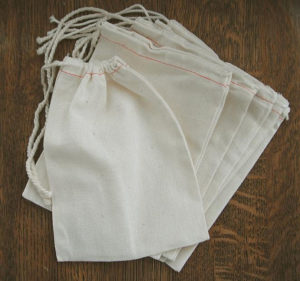 On the other hand, bulk foods require minimal packaging. Naturally, if you buy your bulk in plastic bags, that creates more waste. Instead, do what we do: simply bring the glass jars used to store the food and fill them directly. It greatly helps to cut down on waste. Check out this site for reusable bulk food bags.
On the other hand, bulk foods require minimal packaging. Naturally, if you buy your bulk in plastic bags, that creates more waste. Instead, do what we do: simply bring the glass jars used to store the food and fill them directly. It greatly helps to cut down on waste. Check out this site for reusable bulk food bags.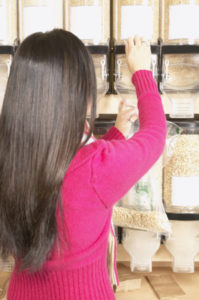 Bulk foods mostly are less expensive than prepackaged foods because excess packaging and marketing labels and fancy logos cost money. I also like that you can buy as little or as much of your bulk items as you want. The store I buy in bulk from is People’s Coop in Ocean Beach. It gives a discount if you buy a large quantity. Buying a large amount of a bulk food item means you will need to buy it less often and, since my family likes to grocery shop only once every other week or so, we tend to buy large amounts. This also helps reduce overall waste. Lots of stores these days also offer milk, yogurt and cream in reusable glass jars that can be returned to the store.
Bulk foods mostly are less expensive than prepackaged foods because excess packaging and marketing labels and fancy logos cost money. I also like that you can buy as little or as much of your bulk items as you want. The store I buy in bulk from is People’s Coop in Ocean Beach. It gives a discount if you buy a large quantity. Buying a large amount of a bulk food item means you will need to buy it less often and, since my family likes to grocery shop only once every other week or so, we tend to buy large amounts. This also helps reduce overall waste. Lots of stores these days also offer milk, yogurt and cream in reusable glass jars that can be returned to the store.
So, if you live in the U.S., Whole Foods and Sprouts are the most common places selling bulk foods, but there are many smaller stores. Zero Waste Home has a very convenient bulk location search.
The local farmers market is also a great place to buy in bulk because the majority of their foods are sold package free and in bulk, and the vendors usually welcome customers bringing their own containers and bags.
Here is a list of things you should try to buy in bulk:
- Meat
- Seafood
- Cheese
- Bread
- Cookies
- Chocolate
- Candy
- Coffee
- Tea
- Grains
- Flours
- Cereal
- Epsom salts
- Shampoo
- Conditioners
- Oils
- Body lotion
- Spices
- Beans
- Lentils
- Nuts
- Seeds
- Cooking oils
- Nut butter
- Honey
- Maple syrup
- Bee pollen
- Kombucha
- Kefir soda
- Milk
- Yogurt
- Cream
- Eggs
- Butter
- Flowers seeds
- Fruit
- Vegetables
- Mushrooms
Learn more tips for how to eat more climate smart and zero waste.


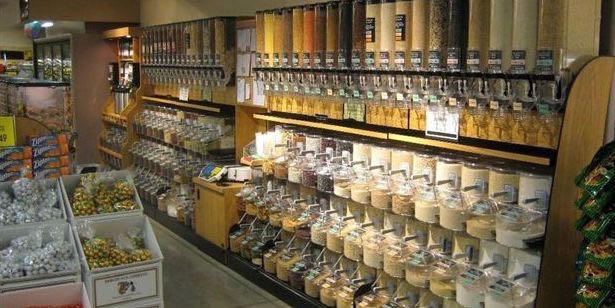

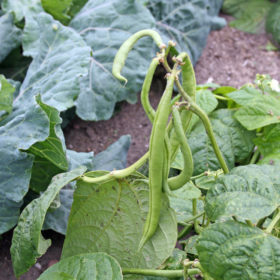

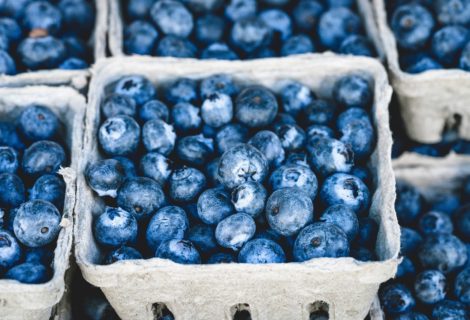
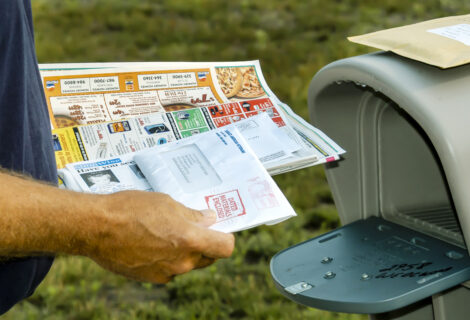
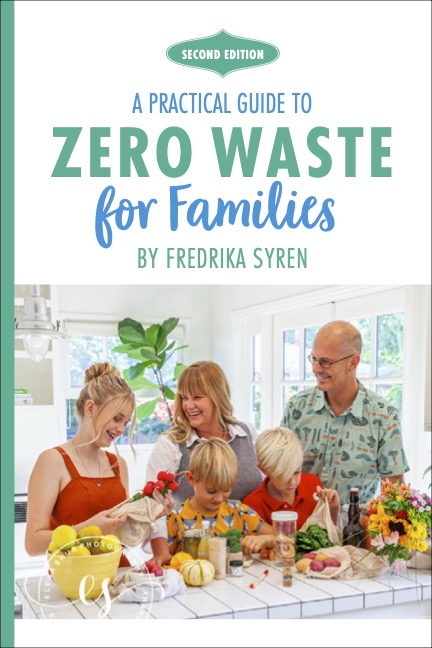

Jackie Bookstein
Hello!
I saw your presentation at the Zero Waste Symposium earlier this year. Very inspirational! You had a great table that was comparing prices between bulk items (from People’s Coop) and packaged items from WholeFoods and Vons I believe. Would you be able to share this with me? And if so, would you mind if I shared it in our public education programs giving you credit for the research? But just having it for internal reference would be amazing too if you prefer.
Thank you!
Luke Smith
It was very informative to know that buying in bulks is more cost-effective, because it offers a larger discount. Me and my wife are planning on opening a gas station here in our area, and we figured that it’s the perfect business for us since we share the same passion for vehicles. While we have no idea where or how to start the manufacturing process, we’ll make sure buy diesel in bulks to save money.
Shammy Peterson
It sure was interesting when you explained that excess packaging and marketing labels cost money, so it will be less expensive to buy bulk foods. With this in mind, I would assume that business owners would benefit from finding a reliable wholesale produce supplier. I could imagine how they could do your tips to keep everything within the budget.
Stock4Shops
Absolutely, I couldn’t agree more! Being a wholesale food supplier myself, I understand the pivotal role that products like confectionery, grocery items, and cleaning supplies play in catering to the needs of small shop owners and retailers. These essentials form the backbone of their businesses, ensuring they can offer a diverse range of products to their customers while maintaining the cleanliness and hygiene standards that are so crucial in today’s world. By providing a reliable source for these necessities, we empower local businesses to thrive and serve their communities effectively.